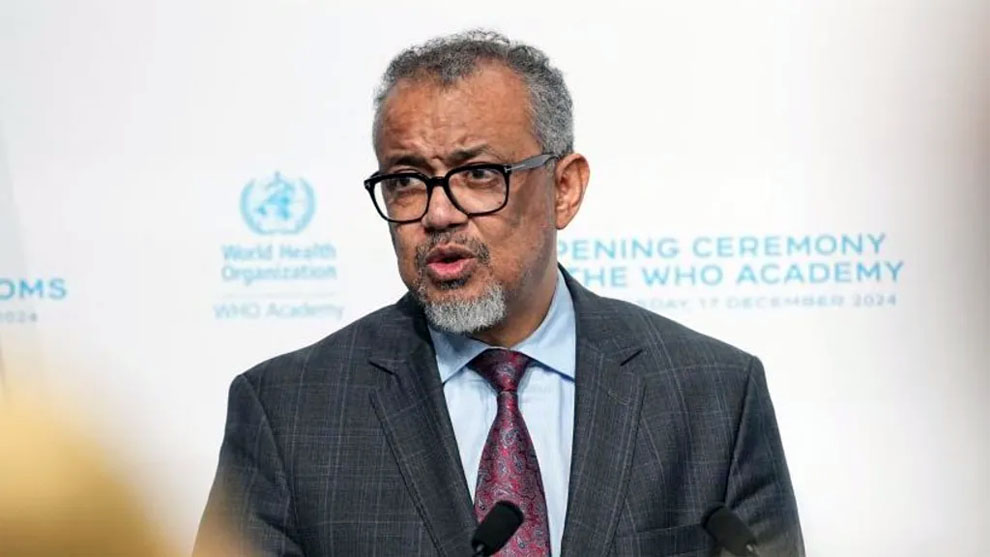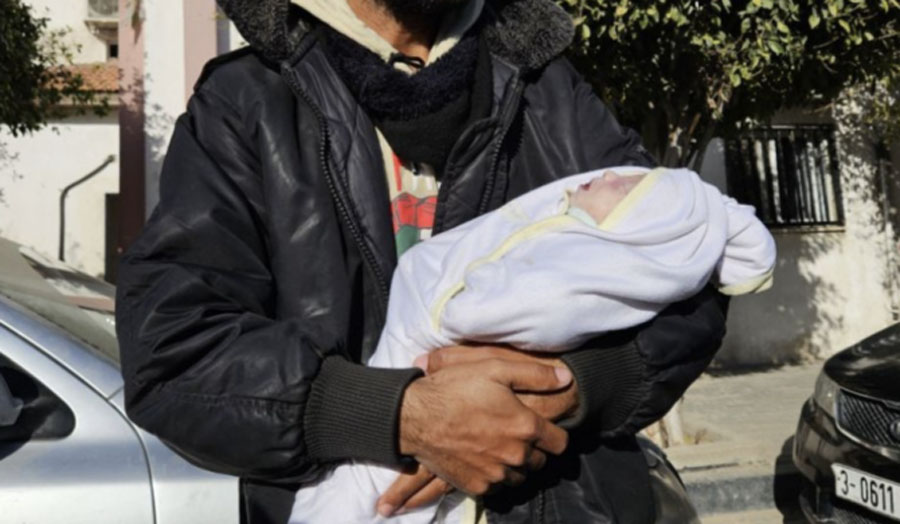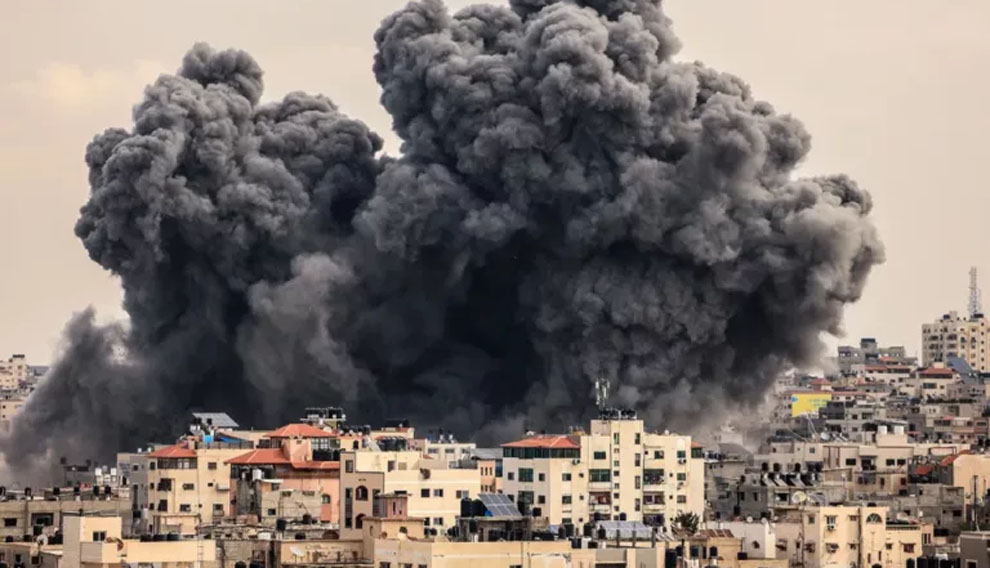International
Detained Telegram boss Durov charged, banned from leaving France

Detained Telegram boss Durov charged, banned from leaving France
Telegram boss and founder Pavel Durov has been placed under formal investigation in France as part of a probe into organised crime on the messaging app, Paris prosecutors say.
Mr Durov, 39, has not been remanded in custody, but placed under judicial supervision, and has to pay a €5m (£4.2m; $5.6m) deposit.
The Russian-born billionaire, who is also a French national, also has to show up at a French police station twice a week and is not allowed to leave French territory.
Mr Durov was first detained upon arrival at Le Bourget airport north of Paris last Saturday under a warrant for offences related to the app.
In Wednesday’s statement, the Paris prosecutors said Mr Durov was put under formal investigation over alleged offences that included:
- Complicity in the administration of an online platform to enable illicit transactions by an organised gang
- Refusal to communicate with authorities
- Complicity in organised criminal distribution of sexual images of children
In France, being put under formal investigation does not imply guilt or necessarily result in a trial – but it indicates that judges consider there is enough of a case to proceed with an investigation.
Mr Durov has so far made no public comments on the latest developments.
His lawyer, David-Olivier Kaminski, said Telegram complied in every respect with European digital regulations and was moderated to the same standards as other social networks.
It was “absurd” to suggest his client could be involved “in criminal acts that don’t concern him either directly or indirectly”, he added.
It is unprecedented for the owner of a social media platform to be arrested because of the way in which that platform is being used, and it has fuelled a fierce debate online about freedom of speech and accountability.
READ ALSO:
- PDP govs now showing courage against Wike – Party group
- Kano airport cleaner returns $10,000 found in aircraft
- Poison Yoruba, Edo video not from Igbo, says Ohanaeze
We have previously seen tech bosses hauled in front of lawmakers for confrontational grillings about their practices and failings, but not met by law enforcement at airports.
Elon Musk, the owner of X, has defended Mr Durov, arguing that moderation is a “propaganda word” for censorship. He has called for Mr Durov’s release.
Chris Pavlovski, the founder of a controversial video-sharing app called Rumble, said he had fled Europe following Mr Durov’s detention.
While most of the world’s largest social networks do engage with national and international bodies when it comes to serious criminal offences such as the sharing of child sexual abuse images, Telegram is accused of ignoring them.
The firm, which is now headquartered in Dubai, insists that its moderation tools meet industry standards.
French President Emmanuel Macron said earlier this week that France was deeply committed to freedom of expression, and that the decision to hold Mr Durov was “in no way… political”.
Huge groups of up to 200,000 people can share and comment on information and content on Telegram – WhatsApp on the other hand limits its maximum group size to just over 1,000.
While Telegram messages can be encrypted, meaning that only the sender and recipient can view them, this is not activated by default and has to be manually switched on to private chats.
On Monday evening, the Paris prosecutors said Mr Durov was being held in custody as part of a cyber-criminality investigation. In response, Telegram said Mr Durov had “nothing to hide”.
Russia said that without a “serious basis of evidence”, the charges could be seen as an act of “intimidation” against a major technology company for political purposes.
Telegram is ranked as one of the major social media platforms.
It was founded in 2013 and is particularly popular in Russia, Ukraine and other former Soviet Union states, as well as Iran.
The BBC revealed on Wednesday that Telegram – which has more than 950 million registered users – has repeatedly refused to join international programmes aimed at detecting and removing child abuse material online.
The BBC has contacted Telegram for comment about its refusal to join the child protection schemes.
Mr Durov, who also founded the popular Russian social media company VKontakte, left Russia in 2014 after refusing to comply with government demands to shut down opposition communities on the platform.
He also holds passports of St Kitts and Nevis and the United Arab Emirates.
Detained Telegram boss Durov charged, banned from leaving France
International
UN health chief at Yemen airport during Israeli strikes

UN health chief at Yemen airport during Israeli strikes
The head of the World Health Organization (WHO) and other UN staff were at Yemen’s international airport in Sanaa on Thursday during Israeli air strikes which are reported to have killed at least six people.
WHO Director General Tedros Adhanom Ghebreyesus said they were about to board a plane when the attacks began.
Houthi-run Saba news agency said three people were killed at the airport and 30 injured. It said another three people were killed and 10 wounded in the western Hodeidah province.
The Iran-backed rebel group described the attacks – which also hit power stations and ports – as “barbaric”. Israel’s military said it carried out “intelligence-based strikes on military targets”.
It is unclear whether the fatalities were civilians or Houthi rebels.
In a statement on X, Dr Tedros said he was in Yemen “to negotiate the release of UN staff detainees and to assess the health and humanitarian situation” in the country. He provided no further details about who the UN detainees were.
Referring to the strikes on Sanaa’s airport, he said: “The air traffic control tower, the departure lounge – just a few meters from where we were – and the runway were damaged.
READ ALSO:
- BREAKING: Adeleke finally pardons ‘fowl thief’ Segun Olowookere
- Five Gaza journalists die in Israeli strike
- Mozambique: Over 1,000 prisoners escape jail as election protests worsen
“We will need to wait for the damage to the airport to be repaired before we can leave,” Dr Tedros added.
UN Secretary General António Guterres called the strikes “especially alarming”.
“I regret the recent escalation between Yemen and Israel, and remain deeply concerned about the risk of further escalation in the region.” he wrote on X.
In a statement, the Israel Defense Forces (IDF) said its “fighter jets conducted intelligence-based strikes on military targets belonging to the Houthi terrorist regime on the western coast and inland Yemen”.
It targeted “military infrastructure” at Sanaa’s airport as well as the Hezyaz and Ras Kanatib power stations, and sites in the Al-Hudaydah, Salif and Ras Kanatib ports on the west coast, the IDF said.
In comments shortly after the strikes, Israel’s Prime Minister Benjamin Netanyahu said it would “continue to cut off the terror arm of the Iranian axis of evil until we complete the job”, adding “we are only just starting with [the Houthis]”.
Early on Friday, the IDF reported that one missile fired from Yemen was intercepted before crossing into Israeli territory.
Mohammed Ali al-Houthi, head of the Houthis’ supreme revolutionary committee, called Thursday’s strikes on Yemen “barbaric” and “aggressive”.
He said that “confrontations with American and Israeli arrogance” will continue until the conflict in Gaza stops.
Several people injured by the strikes at the airport in Sanaa told Houthi-run broadcaster Al Masirah that the runway was struck three times before the airport’s control tower was also hit.
One man, who identified himself as Dr Abbas Rajeh, said the police hospital he works in treated 10 patients after the attacks – one had already died, another was in critical condition, and others had minor injuries or broken bones.
Iran described the strikes as a “clear violation of international peace and security”.
Houthi rebels have been attacking Israel since the first months of the Gaza war, which began in October 2023.
A Houthi missile strike injured more than a dozen people in Israel last week.
Israel has carried out intermittent strikes against Houthis in retaliation.
Earlier this week, Israel’s defence minister said the country was preparing to “strike hard” at the Houthis, warning it would “decapitate” the group’s leadership.
The Houthis are an armed political and religious group backed by Iran. The group has ruled large parts of western Yemen, including the capital Sanaa, since ousting the internationally recognised government in 2015.
UN health chief at Yemen airport during Israeli strikes
BBC
International
Baby freezes to death overnight in Gaza as ceasefire delays

Baby freezes to death overnight in Gaza as ceasefire delays
JERUSALEM: A baby girl froze to death overnight in Gaza, while Israel and Hamas accused each other of complicating ceasefire efforts that could wind down the 14-month war.
The 3-week old baby was the third to die from the cold in Gaza’s tent camps in recent days, doctors said, deaths that underscore the squalid conditions, with hundreds of thousands of Palestinians crammed into often ramshackle tents after fleeing Israeli offensives.
Israel’s bombardment and ground invasion of Gaza has killed over 45,000 Palestinians, more than half of them women and children, according to Gaza’s Health Ministry.
The offensive has caused widespread destruction and displaced some 90 percent of Gaza’s 2.3 million people, often multiple times. Hundreds of thousands are packed into tent camps along the coast as the cold, wet winter sets in. Aid groups have struggled to deliver food and supplies and say there are shortages of blankets, warm clothing and firewood.
Israel has increased the amount of aid it allows into the territory, reaching an average of 130 trucks a day so far this month, up from around 70 a day in October and November. Still, the amount remains well below than previous months and the United Nations says it is unable to distribute more than half the aid because Israeli forces deny permission to move within Gaza or because of rampant lawlessness and theft from trucks.
READ ALSO:
- I was not removed by Tinubu – Ex-Women Affairs minister [VIDEO]
- Ghanaian president approves visa-free entry for all Africans
- Waiting for palliative: Ndume shares on X video of long queues outside Tinubu’s Lagos residence
The father of 3-week-old Sila, Mahmoud Al-Faseeh, wrapped her in a blanket to try and keep her warm in their tent in the Muwasi area outside the town of Khan Younis, but it wasn’t enough, he told The Associated Press. He said the tent was not sealed from the wind and the ground was cold, as temperatures on Tuesday night dropped to 9 degrees Celsius (48 degrees Fahrenheit.) Muwasi is a desolate area of dunes and farmland on Gaza’s Mediterranean coast.
“It was very cold overnight and as adults we couldn’t even take it. We couldn’t stay warm,” he said. Sila woke up crying three times overnight and in the morning they found her unresponsive, her body stiff.
“She was like wood,” said Al-Faseeh. They rushed her to a field hospital where doctors tried to revive her, but her lungs had already deteriorated. Images of Sila taken by the AP showed the little girl with purple lips, her pale skin blotchy.
Ahmed Al-Farra, director of the children’s ward at Nasser Hospital in Khan Younis, confirmed that the baby died of hypothermia. He said two other babies — one 3 days old, the other a month old — had been brought to the hospital over the past 48 hours after dying of hypothermia.
Meanwhile, hopes for a ceasefire looked complicated Wednesday, with Israel and the militant Hamas group that runs Gaza trading accusations of delaying an agreement. In recent weeks, the two sides appeared to be inching toward a deal that would bring home dozens of hostages held by the militants in Gaza, but differences have emerged.
Although Israel and Hamas have expressed optimism that progress was being made toward a deal, sticking points remain over the exchange of hostages for Palestinian prisoners and the withdrawal of Israeli troops from Gaza, people involved in the talks say.
On Wednesday, Hamas accused Israel of introducing new conditions related to the withdrawal from Gaza, the prisoners and the return of displaced people, which it said was delaying the deal.
Israel’s government accused Hamas of reneging on understandings that have already been reached.” Still, both sides said discussions are ongoing.
Israel’s negotiating team, which includes members from its intelligence agencies and the military, returned from Qatar on Tuesday evening for internal consultations, following a week of what it called “significant negotiations.”
During its Oct. 7, 2023, attack on southern Israel, Hamas and other groups took about 250 people hostages and brought them to Gaza. A previous truce in November 2023 freed more than 100 hostages, while others have been rescued or their remains have been recovered over the past year.
Israel says about 100 hostages remain in Gaza — at least a third whom it believes were killed during the Oct. 7 attack or died in captivity.
Sporadic talks have taken place for a year, but in recent weeks there’s been a renewed push to reach a deal.
President-elect Donald Trump, who takes office next month for his second term, has demanded the immediate release of Israeli hostages, saying on social media that if they’re not freed before he is sworn in, there will be “HELL TO PAY.”
Families of the hostages are becoming increasingly angry, calling on the Israeli government for a ceasefire before Trump is sworn in.
After Israel’s high-level negotiation team returned from Doha this week, hostage families called an emergency press conference in Tel Aviv, Israel, pleading for a ceasefire and a complete end to the war.
Shir Siegel, the daughter of Israeli-American Keith Siegel, whose mother was released after more than 50 days in captivity, said every delay could endanger their lives. “There are moments when every second is fateful, and this is one of those moments,” she said.
Families of the hostages marked the first night of Hannukah with a candle lighting ceremony in Tel Aviv as well as by the Western Wall in Jerusalem.
The agreement would take effect in phases and include a halt in fighting, an exchange of Israeli hostages for Palestinian prisoners, and a surge in aid to the besieged Gaza, according to Egyptian, Hamas and American officials. The last phase would include the release of any remaining hostages, an end to the war and talks on reconstruction.
Baby freezes to death overnight in Gaza as ceasefire delays
ARAB NEWS
International
At least 10 killed in Israeli strikes on Gaza

At least 10 killed in Israeli strikes on Gaza
At least 10 people were killed and more than a dozen wounded in Israeli strikes on Gaza early on Thursday, medics with the Gaza health authorities said.
Five people were killed and 20 wounded in an Israeli airstrike on a house in Gaza City’s Zeitoun neighborhood, the medics reported. They warned the death toll could rise as many remained trapped under the rubble.
In a separate incident, five journalists were killed when their vehicle was struck in the vicinity of Al-Awda hospital in Nuseirat in central Gaza, the enclave’s health authorities said. The journalists worked for the Al-Quds Al-Youm television channel.
READ ALSO:
- I was not removed by Tinubu – Ex-Women Affairs minister [VIDEO]
- Ghanaian president approves visa-free entry for all Africans
- Waiting for palliative: Ndume shares on X video of long queues outside Tinubu’s Lagos residence
Palestinian media and local reporters said the vehicle was marked as a media van and was used by journalists to report from inside the hospital and Nuseirat camp.
There was no immediate Israeli comment on the reported strikes.
On Wednesday, Palestinian militant group Hamas and Israel traded blame over their failure to conclude a ceasefire agreement despite progress reported by both sides in past days.
At least 10 killed in Israeli strikes on Gaza
ARAB NEWS
-

 metro3 days ago
metro3 days agoINTERPOL declares 14 Nigerians wanted for drug, human trafficking
-

 metro1 day ago
metro1 day agoJigawa State governor loses son 24 hours after mother’s death
-

 metro3 days ago
metro3 days agoIbadan stampede: She was treated like a terrorist, Queen Naomi’s sister says about her condition
-

 Business2 days ago
Business2 days agoNNPCL launches production monitoring centre
-

 Business2 days ago
Business2 days agoBe creative, monarch, others challenge Muslim professionals on economic revival
-

 Entertainment21 hours ago
Entertainment21 hours agoMultiChoice announces free access to all DSTV channels for 3 days
-

 metro15 hours ago
metro15 hours agoHeavy security in Ilesa as ex-Osun deputy gov emerges new Owa-Obokun
-

 Auto17 hours ago
Auto17 hours agoLSM MD extols founder’s qualities after latter posthumous industry award













